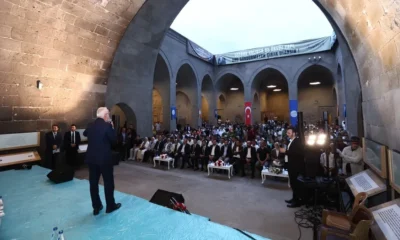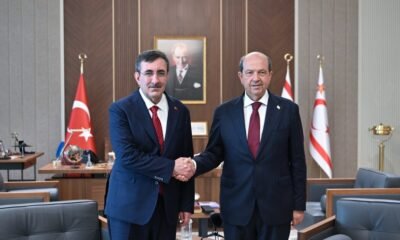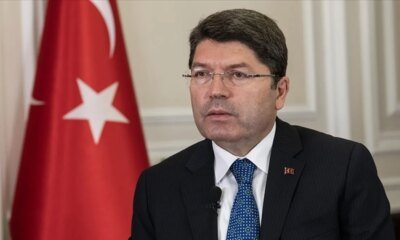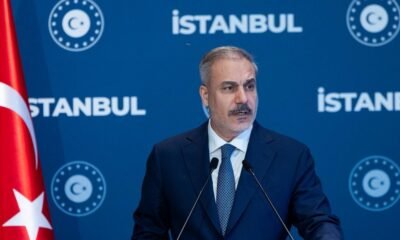Economy
Türkiye won’t allow disinflation process to be derailed: Şimşek
The Turkish government will not allow disinflation to be derailed, according to Treasury and Finance Minister Mehmet Şimşek, who says the process is continuing in a determined manner that will bring inflation into single digits in two years.
Inflation is expected to remain within the range of the central bank’s year-end forecast, Şimşek said, adding that it would fall below 20% next year, backed by income policies aligned with inflation targets and supply-side measures in food, housing and energy, and to single digits in 2027.
“We maintain our year-end inflation forecast; the necessary conditions for disinflation are largely in place,” he told an interview with Reuters. “Disinflation is progressing along our projected path. What matters to us is that this improvement is lasting and stable,” he added.
Official data on Monday showed consumer price inflation slowed to 33.5% in July, the lowest rate since November 2021, having peaked at 75% in May last year.
Food inflation dropped to 28%, core goods inflation to 20.7% and for the first time in over three years, service inflation dipped below 50%, said Şimşek. All components of core inflation declined year-over-year, while monthly increases in producer prices reached their lowest levels since the beginning of the year.
Last month, the Central Bank of the Republic of Türkiye (CBRT) cut its key policy rate by 300 basis points and relaunched an easing cycle that was disrupted by political turmoil earlier this year, as markets calmed and disinflation continued.
Şimşek said coordination of monetary, fiscal, income and supply-side policies would help Türkiye achieve its goals.
“Monetary policy provides strong support to disinflation through the channels of demand, the exchange rate, and expectations, while increased coordination with fiscal policy reinforces this effort,” he said.
Improved expectations and reduced inflation rigidity reflect the results of the government’s determined stance, Şimşek said.
He cited the latest survey by the central bank that showed market participants’ expectations for inflation in 12 months’ time fell to 23.% in July, compared to 45% in October 2023.
“The market expectation for the end of 2026 is around 20%. Of course, this figure reflects an average, and we’re seeing an increase in the number of participants anticipating a rate below 20%,” he added.
“We aim to achieve single-digit inflation in 2027. We will achieve this target through the coordination of monetary, fiscal, income and supply-side policies.”
Prepared for any obstacle
Externally, the overall picture signals cautious optimism, according to Şimşek.
While oil prices, foreign trade tariffs and unprocessed food posed limited upside risks to inflation, he said the government was prepared to “prevent any obstacle to disinflation by taking the necessary steps to counter potential shocks.”
He suggested that risks related to global trade have relatively diminished recently.
Regarding U.S. tariffs, Şimşek said bilateral agreements and customs regimes implemented by Türkiye’s main trade partners may present both opportunities and challenges.
Last week, U.S. President Donald Trump issued a new set of tariffs that will apply to dozens of countries as of Thursday and that include higher duties on Turkish imports.
Under the new measures, tariffs on Turkish products were increased to 15%, compared to 10% that was announced by Trump as a baseline duty in April.
Şimşek said Türkiye was still among the countries subject to the lowest tariffs. “This situation could create us a significant advantage compared to many nations, especially in Asia and Latin America,” he noted.
The minister added that they closely monitor how geopolitical developments impact inflation via commodity prices, particularly volatility in oil prices.
The rise in oil prices in June exerted upward pressure on domestic fuel and transportation services. In July, this pressure eased somewhat with falling prices, said Şimşek.
Despite short-term relief, according to Şimşek, the new oil price equilibrium around $70 is higher than pre-geopolitical tensions.
“This situation indicates that upward risks to inflation remain present,” he noted. However, current indicators and outlook still suggest inflation will remain within the central bank’s forecast range, he added.
The central bank’s year-end inflation midpoint estimate currently stands at 24%, in a forecast range of 19% to 29%.
‘Temporary’ growth slowdown
The government’s medium-term economic program has helped “significantly” reduce external vulnerabilities, increase resilience against shocks and strengthen macro-financial stability, Şimşek noted.
“The program has proven its success through a real stress test against multiple and sequential shocks. We now have a solid foundation for permanent and sustainable high growth; the Turkish economy has entered a positive cycle,” he noted.
Şimşek said economic growth this year could be “slightly below” the medium-term program target of 4%, in what he said was a “temporary slowdown” rather than a sharp economic downturn. In the first quarter, Türkiye’s economy grew 2%.
Despite the temporary slowdown in the short term, Şimşek stressed there is no trade-off between growth and inflation in the medium and long term. “On the contrary, price stability is a prerequisite for sustainable high growth,” he said, according to a Turkish transcript of the interview.
Şimşek went on to cite past performance that he said clearly illustrates this.
In the 1993–2002 period, average inflation was 71.8%, while growth averaged only 3.1%. Between 2003 and 2012, inflation dropped to single digits, averaging 9.3%, and growth rose to 5.7%. In the period 2013–2024, inflation rose to 25.1% on average, while growth fell to 5.1%.
While private consumption slowed on an annual basis in the first quarter, total investments contributed positively to growth. The services and construction sectors maintained strong performance, and the contraction in industrial production was largely due to fewer working days, said Şimşek. Quarterly data showed weakened domestic demand due to tight financial conditions, while the external balance improved, he noted.
In the second quarter, industrial and service production remained flat; demand indicators like retail sales volume and credit card spending performed below trend, according to the minister.
“We expect the output gap to remain in negative territory as of the second quarter and persist through year-end,” Şimşek said.
Spending discipline
The current account deficit will be below the program targets, Şimşek said, adding that budget revenues would fall short of projections due to slower growth and inflation accounting, but the government would remain disciplined on spending.
He said external financing secured under favorable conditions from international financial institutions for development-focused projects reached a total of $17.4 billion in 2023 and 2024, and some $7 billion had been secured so far this year.
“We have established our medium-term cooperation framework with the World Bank, the Islamic Development Bank, and the Asian Infrastructure Investment Bank (AIIB). With the contributions of other institutions, we aim to secure over $40 billion in external financing in the next three years,” he said.
Economy
Trump to add another 25% tariff on India over Russian oil purchases
President Donald Trump issued an executive order Wednesday to place an additional 25% tariff on India over its imports of Russian oil, bringing the combined duties imposed by the United States on its ally to 50%.
The additional tariffs mean India will face the highest levy along with Brazil, putting it at a significant disadvantage against regional competitors such as Vietnam and Bangladesh.
The duties would go into effect 21 days after the signing of the order, meaning that both India and Russia might have time to negotiate with the Trump administration on the import taxes.
The move threatens to further complicate U.S.-Indian relations and comes shortly after an Indian government source said Prime Minister Narendra Modi would visit China for the first time in over seven years later this month.
The total rate will be a “big negative for Indian exports,” said A Prasanna, head of research at ICICI Securities Primary Dealership.
“Many Indian exports will face a handicap versus countries that are in the 15%-30% bucket,” Prasanna said.
First signaled by Trump on Monday, the order follows meetings by Trump’s top diplomatic envoy Steve Witkoff in Moscow aimed at pushing Russia to agree to peace in Ukraine.
Trump has threatened higher tariffs on Russia and secondary sanctions on its allies if Russian President Vladimir Putin does not move to end the war in Ukraine.
As the pressure mounts, India may agree to significantly reduce Russian purchases in a phased manner and diversify to other sources, said Teresa John, an economist at Nirmal Bang Institutional Equities, a Mumbai-based brokerage.
Trump’s moves could scramble the economic trajectory of India, which until recently was seen as an alternative to China by American companies looking to relocate their manufacturing. China also buys oil from Russia, but it was not included in the order signed by the Republican president.
As part of a negotiating period with Beijing, Trump has placed 30% tariffs on goods from China, a rate that is smaller than the combined import taxes with which he has threatened New Delhi.
Trump had previewed for reporters on Tuesday that the tariffs would be coming, saying the U.S. had a meeting with Russia on Wednesday as the Trump administration tries to end the war in Ukraine.
“We’re going to see what happens,” Trump said about his tariff plans. “We’ll make that determination at that time.”
‘Hypocritical’ decision
The Indian government on Wednesday called the additional tariffs “unfortunate.”
“We reiterate that these actions are unfair, unjustified and unreasonable,” Foreign Ministry spokesperson Randhir Jaiswal said in a statement, adding that India would take all actions necessary to protect its interests.
Jaiswal said India has already made its stand clear that the country’s imports were based on market factors and were part of an overall objective of ensuring energy security for its 1.4 billion people.
Ajay Srivastava, a former Indian trade official, said the latest tariff places the country among the most heavily taxed U.S. trading partners and far above rivals such as China, Vietnam and Bangladesh.
“The tariffs are expected to make Indian goods far costlier with the potential to cut exports by around 40%-50% to the U.S.,” he said.
Srivastava said Trump’s decision was “hypocritical” because China bought more Russian oil than India did last year.
“Washington avoids targeting Beijing because of China’s leverage over critical minerals which are vital for U.S. defense and technology,” he said.
In 2024, the U.S. ran a $45.8 billion trade deficit in goods with India, meaning America imported more from India than it exported, according to the U.S. Census Bureau. American consumers and businesses buy pharmaceutical drugs, precious stones and textiles and apparel from India, among other goods.
At the world’s largest country, India represented a way for the U.S. to counter China’s influence in Asia. But India has not supported the Ukraine-related sanctions by the U.S. and its allies on Moscow, even as India’s leaders have maintained that they want peace.
The U.S. and China are currently in negotiations on trade, with Washington imposing a 30% tariff on Chinese goods and facing a 10% retaliatory tax from Beijing on American products.
The planned tariffs on India contradict past efforts by the Biden administration and other nations in the Group of Seven (G-7) leading industrialized nations that encouraged India to buy cheap Russian oil through a price cap imposed in 2022. The nations collectively capped Russian oil a $60 per barrel at a time when prices in the market were meaningfully higher,
The intent was to deprive the Kremlin of revenue to fund its war in Ukraine, forcing the Russian government either to sell its oil at a discount or divert money for a costly alternative shipping network.
The price cap was rolled out to equal parts skepticism and hopefulness that the policy would stave off Putin’s invasion of Ukraine.
The cap has required shipping and insurance companies to refuse to handle oil shipments above the cap, though Russia has been able to evade the cap by shipping oil on a “shadow fleet” of old vessels using insurers and trading companies located in countries that are not enforcing sanctions.
But oil prices have fallen, with a barrel trading on Wednesday morning at $65.84, up 1% on the day.
Economy
Nearly 60% of German firms await more burdens from US trade deal
Close to 60% of German companies expect that a trade deal agreed between the European Union and the U.S. would create more burdens for them through higher tariffs and more bureaucracy, a survey said Wednesday.
That number rises to 74% for companies with a direct U.S. business, according to a flash survey by the German Chamber of Commerce and Industry (DIHK) of around 3,500 firms.
In contrast, 37% do not foresee any effect, while only 5% expect economic relief as a result of the deal that will provide for 15% tariffs on most EU goods starting Thursday.
“This agreement may have been politically necessary, but for many companies in Germany, it is still a bitter pill to swallow,” said DIHK chief executive Helena Melnikov.
Even more problematic is lingering uncertainty on whether the agreement will hold, said Melnikov, urging the EU Commission to push for improvements in further talks with the U.S.
Approximately 80% of companies with direct U.S. business reported that their primary concern is the introduction of new tariffs, with nine out of 10 already experiencing the negative effects of the current policy.
Almost two-thirds of German companies are turning their attention to new markets as a result, with the European single market in particular seen as stable and predictable.
Economy
India braces for hit to $64B US exports amid rising tensions
India is said to be expecting to lose a competitive advantage in about $64 billion worth of goods exported to the U.S. due to President Donald Trump’s 25% tariff and an assumed 10% penalty for buying Russian oil, four sources told Reuters, citing an internal assessment report by the government.
India faces its most serious diplomatic crisis with the U.S. in years after Trump imposed the highest tariffs among Asian peers on goods imported from India, even before any penalty.
A relatively low share of exports in India’s $4 trillion economy is seen limiting the direct impact on growth to 40 basis points. The Reserve Bank of India (RBI) left its gross domestic product (GDP) growth forecast for the current April-March financial year unchanged at 6.5% and held rates steady on Wednesday despite the uncertainty created by tariff hikes.
The trade impact estimates were prepared by the Indian government after Trump announced the unexpectedly high tariff for Indian goods, along with the unspecified penalty. The Indian government, in its assessment report, has assumed a 10% penalty for buying Russian oil, taking the tariff to 35%, the four Indian government sources told Reuters.
They declined to be identified because they were not authorized to speak to the media.
India’s trade ministry did not immediately respond to a request for comment.
Trump said on Wednesday his administration will decide on the penalty for buying Russian oil after the outcome of U.S. efforts to seek a last-minute breakthrough in the Ukraine war. U.S. envoy Steve Witkoff is in Moscow, two days before the expiry of a deadline set by Trump for Russia to agree to peace or face new sanctions.
The impact of the tariff and possible penalty will be on nearly $64 billion worth of India’s exports to the U.S that account for about 80% of total exports to the country, and it will lead to “potential export losses” due to price disadvantages, the four sources said.
The internal assessment report is the government’s initial estimate and will change as the quantum of the tariff imposed by Trump becomes clear, all four sources said.
India exported goods estimated at around $81 billion in 2024 to the U.S., including garments, pharmaceuticals, gems and jewellery, and petrochemicals, according to government data. The South Asian nation’s goods exports to the U.S. constituted 2% of GDP in 2024.
Its total goods exports globally were at $443 billion in 2024.
The proposed tariffs on India’s high-value exports face “erosion of price competitiveness encountering intensified rivalry from countries subject to lower duties,” two sources said, citing the internal assessment.
Russia in focus
India’s National Security Adviser Ajit Doval is in Russia on a scheduled visit and is expected to discuss India’s purchases of Russian oil in the wake of Trump’s pressure on India to stop buying Russian crude, according to a government source.
His visit will be followed by Foreign Minister Subrahmanyam Jaishankar in the weeks to come, amid India’s attempts to placate Washington’s concerns while balancing historical ties with Moscow.
Doval is expected to discuss India’s defense collaboration with Russia, including getting faster access to the pending units of the S-400 air defense system and President Vladimir Putin’s visit to India.
India’s foreign ministry did not immediately respond to a request for comment.
Economy
UK watchdog bans 2 Zara ads featuring ‘unhealthily thin’ models
The British advertising regulator barred two adverts by Spanish clothing giant Zara on Wednesday for featuring models that appeared “unhealthily thin,” calling the images “irresponsible.”
The Advertising Standards Authority (ASA) said that it took action after receiving a complaint about the ads, which were listed on Zara’s website in May.
One image showed a model with “protruding” collarbones, whose pose and styling made her appear “very slim.”
Another featured a model who looked “slightly gaunt” owing to a slicked-back hairstyle and the lighting and clothing made her appear “noticeably thin,” the ASA said.
The watchdog ruled the ads breached social responsibility rules and must not appear again in the same form.
Zara informed the ASA that the models had been medically certified as healthy, in accordance with British guidelines.
It also ensured that only minor lighting and coloring edits were made on the images.
The ads were removed after the ASA made the company aware of the complaint, Zara said in a statement.
It added that Zara “follows stringent guidelines and controls in the selection and photographing of models.”
Earlier this year, the ASA banned similar ads from British retailers Next and Marks & Spencer.
Economy
Trump says to announce Fed picks soon, Bessent to stay at Treasury
U.S. President Donald Trump said Tuesday he would “shortly” name his pick for an open seat on the Federal Reserve’s Board of Governors and possibly announce his nominee for Fed chair as well, while ruling out Treasury Secretary Scott Bessent, who wants to remain in his current role.
Trump called it a “pleasant surprise” that Fed Governor Adriana Kugler had decided to leave her seat now instead of when her term ends in January, according to his interview with CNBC.
That move appears to have accelerated Trump’s decision on who to appoint to an open seat on the Fed board, with possible plans to promote that person to the top policymaking role when Fed Chair Jerome Powell’s term ends in May.
“It’ll be one of four people,” Trump said, adding that he considered both current economic adviser Kevin Hassett and former Fed Governor Kevin Warsh as “very good” possibilities. He did not name the other two, but is reportedly considering current Governor Christopher Waller, who has advocated rate cuts but not at the pace or extent Trump wants.
“There are numerous people that are qualified,” Trump said. “I am going to be announcing that very shortly,” the president said of naming a replacement for Kugler.
“A lot of people say, when you do that, why don’t you just pick the person who is going to head up the Fed? That’s a possibility too,” Trump said.
Trump has been critical of Powell for not cutting interest rates, even as Fed policymakers balance evidence of both a slowing economy and a weakening job market against the fact that inflation remains well above the central bank’s 2% target and is expected to move higher.
Whoever Trump names to Kugler’s seat will need to be confirmed by the Senate, and it would be for a shortened term of only a few months, and require another Senate vote for a full 14-year term early next year.
The nomination for chair of the Fed board would require a separate nomination and Senate confirmation process.
Economy
Trump vows ‘substantial’ tariff hike on India over Russian oil
U.S. President Donald Trump on Tuesday said he would increase the tariff charged on imports from India “very substantially” over the next 24 hours, given the country’s continued purchases of Russian oil.
The threat comes nearly a week after Trump announced 25% tariffs on Indian imports, and U.S. officials have cited a range of geopolitical issues standing in the way of a U.S.-India trade accord.
Trade rift deepened as Trump also threatened unspecified penalties over India’s oil purchases from Russia.
“India has not been a good trading partner, because they do a lot of business with us, but we don’t do business with them,” the president said on Tuesday.
“So we settled on 25% but I think I’m going to raise that very substantially over the next 24 hours, because they’re buying Russian oil,” he told CNBC in a televised interview.
Earlier on Tuesday, India’s ruling party and main opposition condemned Trump’s threat, in a show of political unity.
Manish Tewari, a member of Parliament and leader of the opposition Congress, said Trump’s “disparaging remarks hurt the dignity and self-respect of Indians.”
“The time has come to call out this constant bullying and hectoring,” he added.
BJP Vice President Baijayant Jay Panda quoted Henry Kissinger – the most powerful U.S. diplomat of the Cold War era – in a post on social media platform X: “To be an enemy of America can be dangerous, but to be a friend is fatal.”
India’s Foreign Ministry said the country was being unfairly singled out over its purchases of Russian oil, and highlighted continued trade between Moscow and both the U.S. and the European Union, despite the war in Ukraine.
“It is revealing that the very nations criticizing India are themselves indulging in trade with Russia,” it said in a statement issued late on Monday.
“It is unjustified to single out India,” the ministry said.
It said the EU conducted 67.5 billion euros ($78.02 billion) in trade with Russia in 2024, including record imports of liquefied natural gas (LNG) reaching 16.5 million metric tons.
The United States, the statement said, continues to import Russian uranium hexafluoride for use in its nuclear power industry, palladium, fertilizers and chemicals. It did not give a source for the export information.
Both the United States and the EU have sharply scaled back their trade ties with Russia since it launched a full-scale invasion of Ukraine in February 2022.
In 2021, Russia was the EU’s fifth-largest trading partner, with goods exchange worth 258 billion euros, according to the EU executive European Commission.
Sudden rift
India is the biggest buyer of seaborne crude from Russia, importing about 1.75 million barrels per day of Russian oil from January to June this year, up 1% from a year ago, according to data provided to Reuters by trade sources.
It has faced pressure from the West to distance itself from Moscow since Russia invaded Ukraine. New Delhi has resisted, citing its longstanding ties with Russia and economic needs.
India’s National Security Adviser Ajit Doval is likely to travel to Russia this week on a scheduled visit, two government sources said. Foreign Minister S Jaishankar is expected to visit in the coming weeks.
The sudden rift between India and the U.S. has been deepening since July 31, when Trump announced the 25% tariff on goods being shipped to the U.S. and for the first time threatened unspecified penalties for buying Russian oil.
Trump has said that from Friday, he will impose new sanctions on Russia as well as on countries that buy its energy exports, unless Moscow takes steps to end the war with Ukraine.
The trade tensions have caused concern about the potential impact on India’s economy.
The equity benchmark BSE Sensex closed down 0.38%, while the rupee dropped 0.17% versus the dollar.
-

 Daily Agenda3 days ago
Daily Agenda3 days agoPresident Erdoğan was connected to the “Sözte Youth” program in Kayseri by phone.
-

 Politics2 days ago
Politics2 days agoTürkiye, TRNC deepen cooperation in security, digital governance
-

 Daily Agenda3 days ago
Daily Agenda3 days agoNew Period in Cadastral Disputes: Over 12 thousand files have been concluded
-

 Daily Agenda3 days ago
Daily Agenda3 days agoAK Party Political Academy became a turning point in Turkish politics
-

 Politics2 days ago
Politics2 days agoFM Fidan, Bayramov discuss regional issues in call
-

 Politics3 days ago
Politics3 days agoTürkiye must brace if Israel-Iran war flares up again: Report
-

 Politics2 days ago
Politics2 days agoCHP district mayor accused of funding illicit affair with bribes
-

 Daily Agenda2 days ago
Daily Agenda2 days agoHalf of us and hearts are comfortable nests peaceful




